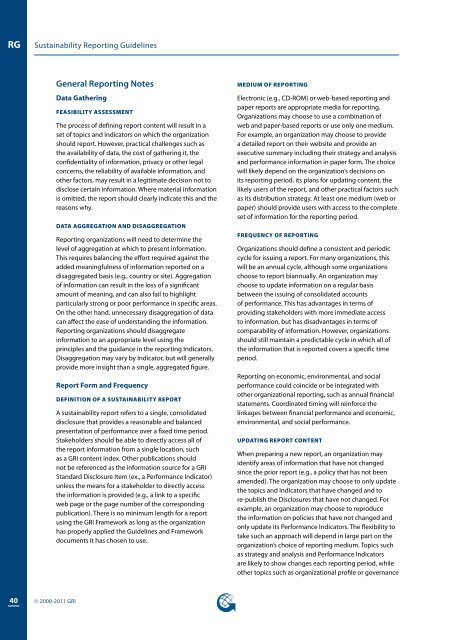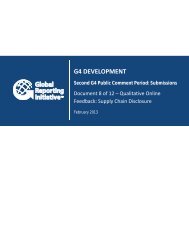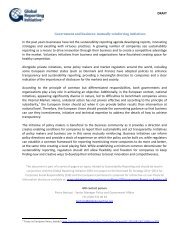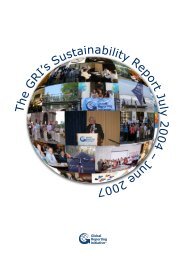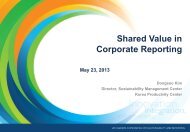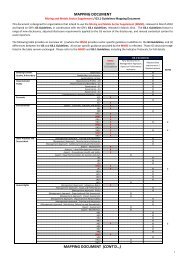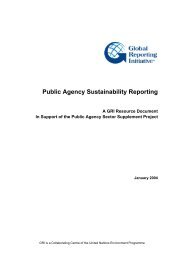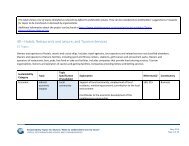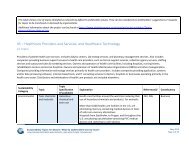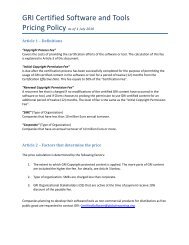G3.1 Sustainability Reporting Guidelines - Global Reporting Initiative
G3.1 Sustainability Reporting Guidelines - Global Reporting Initiative
G3.1 Sustainability Reporting Guidelines - Global Reporting Initiative
You also want an ePaper? Increase the reach of your titles
YUMPU automatically turns print PDFs into web optimized ePapers that Google loves.
RG<br />
<strong>Sustainability</strong> <strong>Reporting</strong> <strong>Guidelines</strong><br />
General <strong>Reporting</strong> Notes<br />
Data Gathering<br />
Feasibility Assessment<br />
The process of defining report content will result in a<br />
set of topics and Indicators on which the organization<br />
should report. However, practical challenges such as<br />
the availability of data, the cost of gathering it, the<br />
confidentiality of information, privacy or other legal<br />
concerns, the reliability of available information, and<br />
other factors, may result in a legitimate decision not to<br />
disclose certain information. Where material information<br />
is omitted, the report should clearly indicate this and the<br />
reasons why.<br />
Data Aggregation and Disaggregation<br />
<strong>Reporting</strong> organizations will need to determine the<br />
level of aggregation at which to present information.<br />
This requires balancing the effort required against the<br />
added meaningfulness of information reported on a<br />
disaggregated basis (e.g., country or site). Aggregation<br />
of information can result in the loss of a significant<br />
amount of meaning, and can also fail to highlight<br />
particularly strong or poor performance in specific areas.<br />
On the other hand, unnecessary disaggregation of data<br />
can affect the ease of understanding the information.<br />
<strong>Reporting</strong> organizations should disaggregate<br />
information to an appropriate level using the<br />
principles and the guidance in the reporting Indicators.<br />
Disaggregation may vary by Indicator, but will generally<br />
provide more insight than a single, aggregated figure.<br />
Report Form and Frequency<br />
Definition of a <strong>Sustainability</strong> Report<br />
A sustainability report refers to a single, consolidated<br />
disclosure that provides a reasonable and balanced<br />
presentation of performance over a fixed time period.<br />
Stakeholders should be able to directly access all of<br />
the report information from a single location, such<br />
as a GRI content index. Other publications should<br />
not be referenced as the information source for a GRI<br />
Standard Disclosure Item (ex., a Performance Indicator)<br />
unless the means for a stakeholder to directly access<br />
the information is provided (e.g., a link to a specific<br />
web page or the page number of the corresponding<br />
publication). There is no minimum length for a report<br />
using the GRI Framework as long as the organization<br />
has properly applied the <strong>Guidelines</strong> and Framework<br />
documents it has chosen to use.<br />
Medium of <strong>Reporting</strong><br />
Electronic (e.g., CD-ROM) or web-based reporting and<br />
paper reports are appropriate media for reporting.<br />
Organizations may choose to use a combination of<br />
web and paper-based reports or use only one medium.<br />
For example, an organization may choose to provide<br />
a detailed report on their website and provide an<br />
executive summary including their strategy and analysis<br />
and performance information in paper form. The choice<br />
will likely depend on the organization’s decisions on<br />
its reporting period, its plans for updating content, the<br />
likely users of the report, and other practical factors such<br />
as its distribution strategy. At least one medium (web or<br />
paper) should provide users with access to the complete<br />
set of information for the reporting period.<br />
Frequency of <strong>Reporting</strong><br />
Organizations should define a consistent and periodic<br />
cycle for issuing a report. For many organizations, this<br />
will be an annual cycle, although some organizations<br />
choose to report biannually. An organization may<br />
choose to update information on a regular basis<br />
between the issuing of consolidated accounts<br />
of performance. This has advantages in terms of<br />
providing stakeholders with more immediate access<br />
to information, but has disadvantages in terms of<br />
comparability of information. However, organizations<br />
should still maintain a predictable cycle in which all of<br />
the information that is reported covers a specific time<br />
period.<br />
<strong>Reporting</strong> on economic, environmental, and social<br />
performance could coincide or be integrated with<br />
other organizational reporting, such as annual financial<br />
statements. Coordinated timing will reinforce the<br />
linkages between financial performance and economic,<br />
environmental, and social performance.<br />
Updating Report Content<br />
When preparing a new report, an organization may<br />
identify areas of information that have not changed<br />
since the prior report (e.g., a policy that has not been<br />
amended). The organization may choose to only update<br />
the topics and Indicators that have changed and to<br />
re-publish the Disclosures that have not changed. For<br />
example, an organization may choose to reproduce<br />
the information on policies that have not changed and<br />
only update its Performance Indicators. The flexibility to<br />
take such an approach will depend in large part on the<br />
organization’s choice of reporting medium. Topics such<br />
as strategy and analysis and Performance Indicators<br />
are likely to show changes each reporting period, while<br />
other topics such as organizational profile or governance<br />
40<br />
© 2000-2011 GRI


